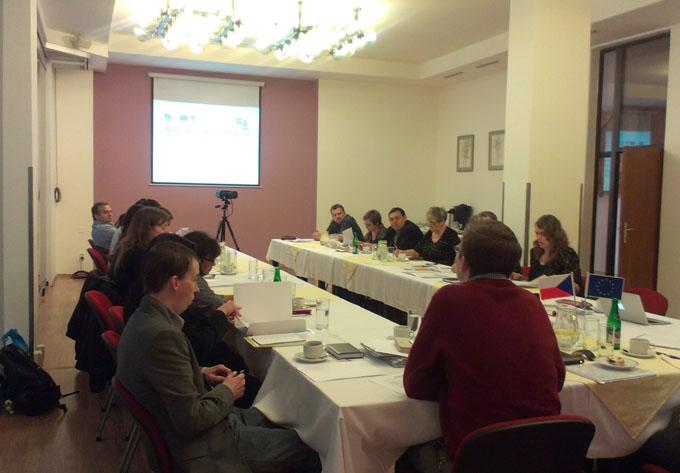Victims of the breakup of Czechoslovakia have one year left to resolve their situations

On Tuesday, 7 May 2013, a round table was convened in the Czech town of Ústí nad Labem by the Counseling Center for Citizenship/Civic and Human Rights (Poradna pro občanství/Občanská a lidská práva) on the issue of new draft legislation about citizenship. The round table was attended by 20 experts from local authorities, NGOs, and Czech Police.
The draft legislation may significantly influence the lives of hundreds of people, including many Romani people living in the Czech Republic who to this day can be considered victims of the division of Czechoslovakia. The main victims of that separation were Slovaks who had moved from Slovakia to the Czech Republic when the two countries were still one state.
After 1992, such people were told by Czech authorities that they must assume the citizenship of the Slovak Republic. This category included thousands of Romani people who had lived for decades on the territory of the Czech Republic, as well as no small number of Romani people who were born and lived in the Czech Republic and had practically no ties to Slovakia.
“The main criterion for awarding Czech citizenship after the federation broke up was the place of birth of your forebears prior to 1954. If someone was born in the Czech Republic in 1955 to parents who came from Slovakia, then that person and all his descendants were supposed to become Slovak citizens. The way in which Czechoslovakia addressed its breakup was not much different from that of other Eastern European states. For example, in the Baltic states citizenship is determined by the place of birth of your forebears as of 1939,” says Mgr. Pavel Čižinský, a lawyer with the Counseling Center.
Former citizens of Czechoslovakia living on the territory of the Czech Republic could, in principle, choose to apply for Czech citizenship even if they had been assigned Slovak citizenship. The law, however, established certain conditions and limits to qualifying for Czech citizenship which not everyone could fulfill.
“The law at that time required proof that you were registered in the Czech Republic as a permanent resident (initially that you had been registered for two years, and subsequently that you had been registered for five years), a document confirming that you had renounced Slovak citizenship, and a clean criminal record for the preceding five years in order to qualify for Czech citizenship,” said Mgr. Miroslav Dvořák, director of the Counseling Center. The process of applying for Czech citizenship was rather demanding in terms of administration and many socially vulnerable people were not able to put together the necessary documents.
The situation affected many homeless people, many prisoners, many residents of social care institutions, and thousands of Romani people specifically. Many Romani families had been living in the Czech Republic for years without documents, which exacerbated to their social problems. However, even those with documents were also forced to address this problematic situation.
Bc. Lenka Balogová, head of the Ústí branch of the Counseling Center, said that she “recalls that period very well, many Romani people from what was then the North Bohemian Region lost their jobs after it underwent a deep industrial restructuring. They could not register with the Labor Office as job seekers, they had no right to unemployment benefits, and they could not receive either health insurance or social security, just because their identity cards listed, as their place of permanent residence, the original residence of their parents in Slovakia. In the end we are still addressing these problems to this day as part of our social work in the Ústí Region.”
The situation did not fundamentally improve until the government of Miloš Zeman took office in 1999. Section 18a of the Law on Acquiring and Rescinding Citizenship of the Czech Republic established that everyone living on the territory of the Czech Republic as of 31 December 1992 was entitled to citizenship in the Czech Republic by declaration, without any other conditions.
On the basis of that statute, tens of thousands of former Czechoslovak citizens got Czech citizenship, among them thousands of Romani people who had fallen victim to the separation of the state. Of course, not all of these cases have been resolved. The Counseling Center alone records dozens of cases every year of people who have been living in the Czech lands since the communist era but who still have Slovak citizenship only.
Mgr. Martina Štěpánková, a lawyer with the Counseling Center, says the reasons many people have not yet been able to arrange for Czech citizenship have particularly to do with the fact that “many people still have no idea at all that they do not actually have Czech citizenship. The situation in this area is also still complicated by the fact that many bureaucrats, and even many NGO staffers, are not completely competent when it comes to this issue, and are therefore unable to provide information about it that is both correct and necessary. Last but not least, it is also the case that many socially vulnerable people are incapable of managing matters administratively, like arranging for a copy of a birth certificate or applying for a passport.”
The Czech Interior Ministry now wants to abolish Section 18a. At the urging of the Counseling Center, the legal effect of that section has been extended by one year only (see Section 72 of the new law) i.e., until 31 December 2014. The Counseling Center is now doing its best to convince senators to keep the measure in force for a longer period, such as 10 years.